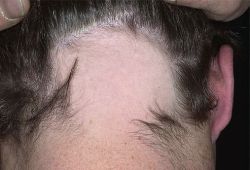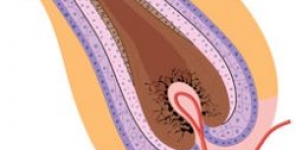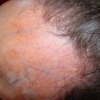IL-2RA e il locus TNF/LTA sono fattori di rischio per l'alopecia areata grave
 L'alopecia areata (AA) è la seconda causa più comune di perdita di capelli negli esseri umani, e ha un patrimonio geneticamente complesso. L'ipotesi che AA sia di natura autoimmune è supportata da studi precedenti.
L'alopecia areata (AA) è la seconda causa più comune di perdita di capelli negli esseri umani, e ha un patrimonio geneticamente complesso. L'ipotesi che AA sia di natura autoimmune è supportata da studi precedenti.
Questi studi, infatti, hanno riportato l'associazione con specifici alleli HLA, così come le varianti genetiche di altri geni implicati nella autoimmunità, tra cui diversi geni per le citochine.
Tuttavia, questi non si possono ancora considerare loci di suscettibilità provati, dal momento che molti di questi risultati di associazione sono derivati da studi su piccoli campioni di pazienti.
Obiettivo: Studiare l'associazione tra AA e geni di citochine selezionate, utilizzando un campione di 768 pazienti con AA e 658 controlli, tutti provenienti dalle regioni centrali dell'Europa.
Metodi: Sono stati genotipizzati undici polimorfismi a singolo nucleotide (SNPs) dei geni delle citochine implicati in precedenti studi su AA. Questi geni sono stati IL-1B, IL-1A, IL-1RN, MIF, IFNG, e la regione del gene TNF/LTA. Abbiamo anche genotipizzato 15 SNPs scelti tra geni delle citochine che avevano mostrato un'associazione significativa con altre malattie autoimmuni. Questi geni sono stati IL-10, IL-36RN, IL-12B, IL-6, IL-2, IL-23, IL-2RA, e IL-4R.
Risultati: Un'associazione significativa è stata trovata per due varianti all'interno sia di IL-2RA che di TNF/LTA. Nel campione generale, i risultati più significativi sono stati ottenuti per la variante di IL-2RA, rs706778 (P = 0.00038), e la variante locus di TNF/LTA, rs1800629 (P = 0.0017). Nelle analisi dei sottogruppi, in base alla gravità, all'età di insorgenza, e alla storia familiare, questi effetti sono stati più forti nei pazienti gravemente affetti, con i più bassi valori di P che si sono ottenuti per rs706778 (P = 3.8*10−6).
Conclusioni: I nostri risultati si concentrano sul coinvolgimento di IL-2RA e della regione di TNF/LTA nell'eziologia di AA — in particolare di AA grave -, e forniscono ulteriore supporto all'ipotesi che AA sia di natura autoimmune.
Storia della pubblicazione:
Titolo: Investigation of selected cytokine genes suggests that IL-2RA and the TNF/LTA locus are risk factors for severe alopecia areata
Rivista: British Journal of Dermatology. doi: 10.1111/bjd.12004
Autori: S. Redler, F. Albert, F.F. Brockschmidt, C. Herold, S. Hanneken, S. Eigelshoven, K.A. Giehl, R. Kruse, G. Lutz, H. Wolff, B. Blaumeiser, M. Böhm, T. Becker, M.M. Nöthen, R.C. Betz
Affiliazioni: Institute of Human Genetics, University of Bonn, Bonn, Germany
Department of Genomics, Life & Brain Center, University of Bonn, Bonn, Germany
German Center for Neurodegenerative Diseases (DZNE), Bonn, Germany
Department of Dermatology, University of Düsseldorf, Düsseldorf, Germany
Department of Dermatology, University of Munich, Munich, Germany
Dermatological Practice, Paderborn, Germany
Dermatological Practice, Hair & Nail, Wesseling, Germany
Department of Medical Genetics, University and University Hospital of Antwerp, Antwerp, Belgium
Department of Dermatology, University of Münster, Münster, Germany
Institute for Medical Biometry, Informatics and Epidemiology, University of Bonn, Bonn, Germany
Abstract:
Background: Alopecia areata (AA) is the second most common cause of hair loss in humans, and has a genetically complex inheritance. The hypothesis that AA is autoimmune in nature is supported by previous studies. These report association with specific HLA alleles, as well as genetic variants of other genes implicated in autoimmunity, such as various cytokine genes. However, these cannot yet be considered proven susceptibility loci, since many of these association findings were derived from small patient samples.
Objective: To investigate association between AA and selected cytokine genes using a sample of 768 AA patients and 658 controls of Central European origin.
Methods: Eleven single nucleotide polymorphisms (SNPs) from cytokine genes implicated in previous AA studies were genotyped. These genes were IL-1B, IL-1A, IL-1RN, MIF, IFNG, and the TNF/LTA gene region. We also genotyped 15 SNPs selected from cytokine genes that have shown significant association with other autoimmune diseases. These genes were IL-10, IL-36RN, IL-12B, IL-6, IL-2, IL-23, IL-2RA, and IL-4R.
Results: Significant association was found for two variants within both IL-2RA and TNF/LTA. In the overall sample, the most significant results were obtained for the IL-2RA variant rs706778 (P = 0.00038), and the TNF/LTA locus variant rs1800629 (P = 0.0017). In subgroup analyses, according to severity, age of onset, and family history these effects were stronger in the severely affected patients, with the lowest P-values being obtained for rs706778 (P = 3.8*10−6).
Conclusions: Our results point to the involvement of IL-2RA and the TNF/LTA region in the aetiology of AA — in particular severe AA -, and provide further support for the hypothesis that AA is autoimmune in nature.



